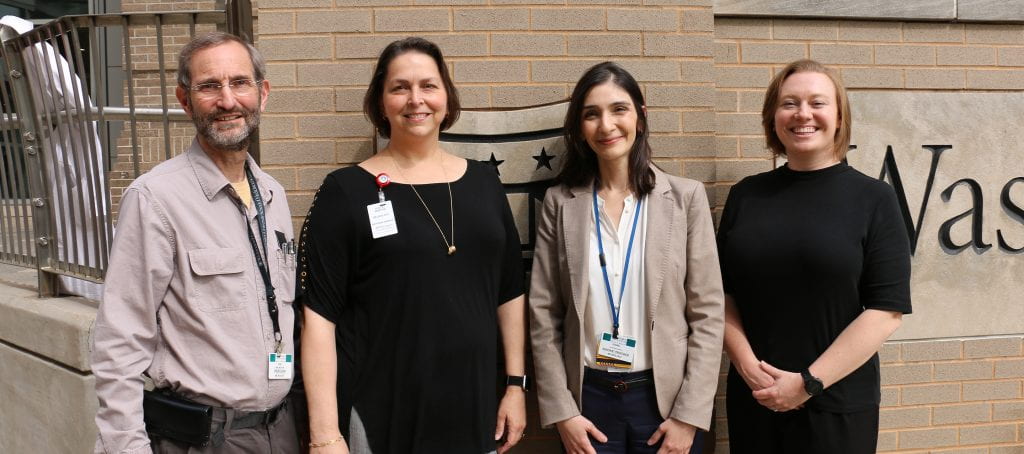About Huntington’s Disease
Huntington’s Disease (HD) is a hereditary degenerative brain disorder which leads to both physical and mental disabilities. Symptoms usually appear between the ages of 30 and 50 but can begin anytime throughout the lifespan, including childhood and old age. Symptoms include a range of cognitive, affective, behavioral and physical manifestations including forgetfulness, personality changes, involuntary movements and difficulty swallowing. Each person is affected individually and may display different symptoms, and symptoms progress over time. Every child born to an affected person has a 50% chance of inheriting the gene which causes the disease. It affects woman and men equally, as well as people of all racial and ethnic backgrounds. Currently there is no cure nor are there disease-modifying treatments for the disease, however symptomatic treatments are available and a great deal of research is ongoing throughout the world.
Why a Center of Excellence?
The Huntington’s Disease Society of America (HDSA) Centers of Excellence were designated to create stable regional centers which offer the best clinical care and services for those affected by HD and their families. Centers staff includes neurologists, psychiatrists, social workers, physical and occupational therapists and other professionals, all with the commitment to caring for individuals with HD and their families.
About our center
At Washington University, we are committed to providing comprehensive services for individuals with Huntington’s disease and their families. Our Center is located within the Department of Neurology, Movement Disorders Section. We serve the Midwest area, drawing individuals from Missouri, Kansas, Iowa, Arkansas, Southern Illinois and beyond.
We maintain a presence on Facebook and invite you to follow our page.

Services available
- Pre-symptomatic genetic testing
- Clinical care
- Occupational Therapy
- Counseling
- Support groups
- Genetic counseling
- Research opportunities
- Information and referral
- Social work support
- General HD information
- In-home visits/nursing home visits (limited area)
- Professional education/speaker’s bureau
Research
The HDSA Center of Excellence staff is active in HD research. There are a number of clinical trials and observational studies going on all the time. Regardless of your HD status (including at-risk), you may be eligible to participate in research if you are from a family affected by HD.
For more information, please contact our center social worker at 314-362-3471 or bartons@wustl.edu.
Pre-symptomatic genetic testing
The HDSA Center of Excellence at Washington University School of Medicine provides pre-symptomatic testing utilizing the established pre-symptomatic genetic testing protocol, with the goal of providing adequate support and education to at-risk individuals interested in learning their HD gene status.
Pre-symptomatic genetic testing allows individuals who are at-risk for Huntington’s Disease because of a positive family history, to learn whether or not they have inherited the HD gene prior to the onset of any symptoms. The decision of whether or not to have predictive testing is a personal one, and not to be made lightly. Because of the implications of learning prior to the onset of symptoms whether a person is at-risk of a degenerative illness are far-reaching, it is important that those seeking this testing receive adequate support, education and assessment of readiness for this information. Below is a brief summary of the testing protocol followed at Washington University School of Medicine. For more specific information, or to discuss your personal concerns related to testing, please contact our center social worker.
Prior to seeking testing, you may want to consider some important matters. In addition to considering these issues prior to beginning testing, you will discuss these with our staff prior to beginning testing and/or during the testing process. Some of these issues include: cost/insurance, emotional implications of results, effect on the family, practical considerations for long term planning, potential for discrimination, confidentiality, and other concerns.
Cost
The costs associated with pre-symptomatic testing include pre-test counseling and clinical assessments, the genetic test itself, and in some cases counseling afterwards. When you contact us about predictive testing, we will discuss your payment options with you. Please contact us for detailed information about the cost of testing.
Next steps
An individual interested in going through pre-symptomatic genetic testing should begin by making contact with our center social worker by phone and/or email. During this call, you will discuss your family’s history of HD, your motivation for testing at this time, and the schedule of our testing protocol, if it is decided that you wish to proceed. Costs of testing are discussed prior to beginning the testing protocol. Testing involves at least two visits to our center:
The first visit is a lengthy one. You will meet with the social worker for genetic and HD education and a discussion of the practical steps to take before receiving your results. In addition to reviewing the genetics and course of HD, you will also be educated about the implications of testing on insurability. You will next meet with the neurologist for a neurological exam to determine if there is any evidence of manifest HD. Next you will meet with the neuropsychiatrist for an assessment of your emotional and behavioral risks. While it is rare, it is possible that after these initial appointments the pre-symptomatic testing team may determine that it is not appropriate to move forward with testing or may recommend delaying testing until a later date. In these cases, the cost of the completed appointments is not refundable. Following the completion of your clinical visits, you will meet again with the social worker. If genetic testing is to proceed, you will complete consent forms and your blood will be drawn.
During the second visit, your test results will be revealed to you. Both the center social worker and the neuropsychiatrist are involved with this visit.
A third visit is also scheduled, but is considered optional. This is a follow up visit with our social worker a few weeks after your test results. We schedule this appointment regardless of results. We may recommend, or you may choose to have, ongoing counseling and support. Please discuss this with our center social worker if you have questions.
We strongly recommend that you have a support person with you for your visits. Generally, it is best if your support person is not also a person at-risk for HD, because it is important this person is able to fully support you without regard to his/her own HD risk. We will consider requests outside of our recommendations on a case by case basis.
It is acceptable for you to decide to forego testing at any point during the protocol. For example, if after your initial counseling appointments you decide not to have your blood drawn, this request is honored. You may also decide not to receive the results of your test. In this case, we will hold the copy of your results and if in the future you wish to receive them, this option will be available to you. In this case, we may require additional counseling visits with one or more of our team members before receiving the results. Any costs already incurred will not be refunded in the event testing is not completed, but you will not be liable for any costs of services not yet provided.
Confidentiality
Confidentiality is an important feature of the predictive testing protocol. There are numerous safeguards in place to protect your confidentiality and additional concerns about unintended disclosure will be discussed during your initial phone call and visit with the social worker. At this time, anonymous testing is not available.
Important considerations of predictive testing
- We will not test at-risk, non-symptomatic minors. There are no exceptions to this policy.
- We can provide counseling and referral for those who wish to consider prenatal genetic testing or receive information on preimplantation genetic testing. In some cases, this can be done without disclosure of the genetic status of the mother.
- In some cases, the results of one individual may disclose another person’s gene status, such as in the cases of identical twins or in cases where the parent of the person seeking testing is at-risk but not symptomatic.
In all of these situations, significant counseling is required before going forth with the testing protocol.
Huntington’s Disease resources
- HDSA Center of Excellence at Washington University School of Medicine Facebook
- Huntington’s Disease Society of America
- HDSA Missouri Chapter
- HD Support Groups
- Huntington’s Disease Youth Organization
- HDSA National Youth Allicance
- Huntington Study Group
- HD Buzz
- National Institutes of Health Huntington’s Disease Information
- HD Trial Finder
Director
Contact us
For general inquiries, please call Stacey Barton, Clinic Social Worker
Phone: 314-362-3471
Email: bartons@wustl.edu
For other needs, such as appointments, refills, or to contact your doctor, please call the clinic at 314-362-6908 or message us through MyChart.
